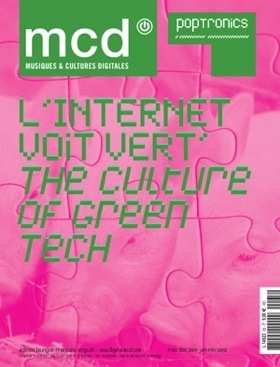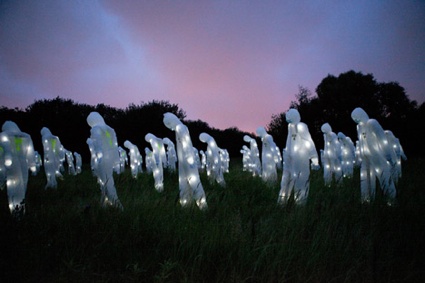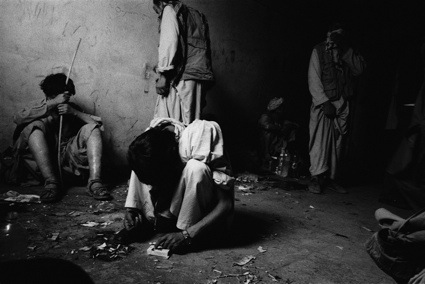 MCD#65 The culture of green tech is a bilingual (french/english) magazine. Each edition brings the spotlight on one particular theme. Previous issues of MCD focused on the Internet of Things, Media Labs in Europe, Gaming, Digital Festivals.
MCD#65 The culture of green tech is a bilingual (french/english) magazine. Each edition brings the spotlight on one particular theme. Previous issues of MCD focused on the Internet of Things, Media Labs in Europe, Gaming, Digital Festivals.
Here’s how the green tech issue is introduced: The inventors of digital and “post-digital” creation are raising issues about production and energy under a new light: they are already testing solar-powered 3D printers in the desert, using sand as raw material. Soon buildings will swap peer-to peer energy through photovoltaic systems, you will make an open source box to know the number of available public bicycles down in your street, you will no longer run after a bus, it will come to you. Some web artists are even providing us “the first in a promising line of tireless, unstoppable, robotic class warriors”!
In this issue, you will discover how technological creativity is here to help saving the planet, and how each one of us is a potentially actor regarding these ideas meant to make the world more sustainable.
 Luzinterruptus, Radioactive Control
Luzinterruptus, Radioactive Control
As you can guess from the excerpt above, MCD is aimed at a broad audience. You don’t need to be an art&tech aficionado to enjoy the essays and interviews. Content, style and design are everything but intimidating (well, the cover is a bit daunting.) And if you’re already pretty versed in digital culture, you might still learn -or rediscover- a thing or two. A few French initiatives on the topic of green tech for example, such as artists, associations and designers’ eco-experiments in Nantes, European green capital of 2013. Or Bureau d’études’s ideas for a Parliament which brings humans, animals and plants closer together. There’s also a conversation between Jean-Baptiste Labrune and artist David Guez and an interview with Art Orienté Objet about their appeal to list Lake Clifton as a World Heritage Site. The French duo hope that the move will save the thrombolites, rock-like structures built by micro-organisms and often regarded as the earliest geographical features of primitive life on Earth (sign the petition over here.) There’s also a fascinating interview with Hugo Sossah. Founder of Ashelvea, a French company that claims to manufacture ‘the cleanest computers in the world’ (or rather, as Sossah concedes “the less polluting ones”), he is struggling to convince French banks to help his business grow as much the high demand for his 80% recyclable computers would require.
Plenty of usual suspects on the international front: Critical Art Ensemble, HeHe, FoAM, Joshua Allen Harris, etc.
And a couple of names i wasn’t familiar with.
 Image © Stanley Greene / Noor Images
Image © Stanley Greene / Noor Images
The work of photojournalist Stanley Greene appears in a series of essays about the human cost of our addiction to electronics. One of the essays offers a list of artistic works that engage with the war waged to control coltan. Another text from this group of essays explores Greene’s E-Waste Trail, a photo documentary series “that tracks the afterlife of our electronic trash, as corporations and governments make irresponsible, yet lucrative, deals, at enormous injury to the world’s most vulnerable citizens.”
Other notable articles include Eric Kluitenberg‘s look into the way we inhabit our current ‘technological ecologies’ and celebration of the Whole Earth Catalog, an American counterculture catalog first published in 1968 and dedicated to the alliance of technology and ecology.
MCD#65 The culture of green tech is a timely publication. 2009 saw plethora of festivals, exhibitions and conferences dedicated to sustainability, ‘greener planet’ and ecology. I attended so many of them i ended up turning into a cynical eco-phobic. The following year, culture moved to other issues (financial crisis, anyone?) but the relevance of an artistic reflection on green living and green tech is as high as ever. MCD#65 proposes an intelligent, critical view that goes beyond the monolithic ‘green is beautiful’ moto and looks into the dilemma and contradictions of green tech.
The opening article illustrates the point by putting into graphics and numbers the carbon footprint of our digital lifestyle. Switching to digital involves less paper, less DVDs, less transports but it also energy-devouring data centers. France’s 38 million web users produce over 376 000 tons of CO2 per year. That’s the equivalent of a European city inhabited by 45 000 people.
A few pages are also dedicated to the ‘eco-festivals’, techno music festivals that offer sawdust toilets, solar panels, reusable cups, etc. The author of the article asks whether they are a valuable attempt to limit the pollution that any festival create or little more than an exercise in eco-marketing.
MCD#65 comes with lucidity thus, but also with enthusiasm and energy. I’m looking forward to see what their upcoming issues will be about.
I do need to say something about the translation though. I started reading the version in french and as usual, i was baffled by the French’s fear of adopting english words. So you get words like le pair à pair instead of peer-to-peer. There were a few more gems but that one kept me laughing for hours. Anyway, halfway through the mag, i decided to skip to the english version of the text and all i can say is “Guys, get a professional translator!” If I, who makes Maurice Chevalier sound like Henry Higgins , finds errors of english in almost each paragraph then you’d better hire a proof-reader or a translator whose mother language is english.
You can buy MCD#65 The culture of green tech as well as other issues of MCD in PDF format or order the paper version.
Image on the homepage; HeHe, Toy emissions (My friends all drive Porsches), New York, 2007.
